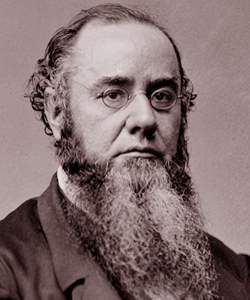Edwin McMasters Stanton, Election of 1860 & Secession Crisis (American National Biography)
Scholarship
When the Democratic party split on the sectional issue in 1860, Stanton followed Buchanan and Black in supporting John C. Breckinridge, the presidential nominee of the southern Democrats, because he considered Breckinridge the only candidate capable of preserving the Union. During a cabinet shake-up in December 1860, Black became secretary of state, and Buchanan appointed Stanton to replace him as attorney general. Throughout the closing months of Buchanan's term, Stanton strove forcefully to preserve the Union. In the cabinet, he and Black constantly pressured the vacillating president to adopt a strong position against secession and to retain control of Fort Sumter and other forts along the southern coastline. Moreover, Stanton secretly passed information on cabinet deliberations to Senator William H. Seward and other Republicans in Congress. During his brief tenure as attorney general, Stanton did as much as anyone in the administration to stiffen Buchanan's stand and resist the secessionist surge.
William B. Skelton, "Stanton, Edwin McMasters," American National Biography Online, February 2000, http://www.anb.org/articles/04/04-00942.html.
Edwin McMasters Stanton, Secretary of War (American National Biography)
Scholarship
As secretary of war, Stanton became increasingly disillusioned with his erstwhile friend McClellan, who had remained ensconced in the Washington defenses since the summer of 1861 and showed little inclination to take the offensive against the Confederate forces in Virginia. In March 1862 Stanton and other cabinet members convinced Lincoln to remove McClellan as commanding general of the entire army, though McClellan continued to command the Army of the Potomac. For several months in the spring and early summer of 1862, Lincoln and Stanton performed the role of commanding general. The two civilians pressured McClellan into launching his Peninsula campaign, personally directed the capture of Norfolk, and devised a nearly successful plan to trap Confederate general Thomas J. "Stonewall" Jackson's army in the Shenandoah Valley. In a controversial move, however, Stanton suspended recruiting in early April in order to reorganize the recruiting service--and in the apparent belief that the war would soon be over. Because of this step, as well as the administration's decision to detain Major General Irvin McDowell's corps as a shield for Washington, D.C., McClellan and his Democratic supporters claimed that the secretary of war had withheld essential reinforcements from the Peninsula offensive, contributing to its failure. While these charges were unfounded--McClellan's army strongly outnumbered the Confederates throughout the campaign--Stanton and McClellan remained bitter enemies, each calling for the removal of the other, until Lincoln finally relieved McClellan of command in November 1862.
William B. Skelton, "Stanton, Edwin McMasters," American National Biography Online, February 2000, http://www.anb.org/articles/04/04-00942.html.





